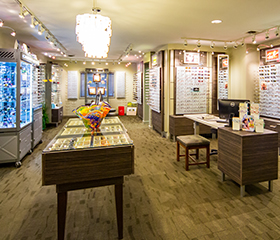Age-related Macular Degeneration or AMD is a disease that causes a slow and painless loss of central vision. Central vision is what you use when you look straight at an object; it allows you to see fine detail needed when reading or driving.
On the inside of the eye is the retina, which contains over 120 million light sensitive cells or photoreceptors. The largest concentration of photoreceptors is in the macula, located in the center of the retina .
Directly behind the photoreceptors is the pigment layer, and behind that is the choroid, containing the blood supply to the retina.
Macular Degeneration occurs in two forms: dry and wet.
In the dry form, cellular debris called drusen accumulates between the retina and the choroid; and the retina can separate. The risk is considerably higher when the drusen are large and numerous, which can disturb the pigmented cell layer under the macula.
At the onset, most patients with the dry form have good vision. But over time, as the disease progresses, colors appear less bright and print may appear blurry or distorted. A dark area or empty area can appear in the center of vision. In about 10% of patients with the dry form, the disease progresses to the more serious wet form.
In the neovascular, or wet form, damage to the macula can occur rapidly. Proteins in the eye cause abnormal blood vessels to spring up from the choroid behind the retina. As the blood vessels grow, they can leak blood and fluids that kill the photoreceptors, causing permanent blind spots. Eventually the retina can also become detached.
Patients may see a dark spot in the center of their vision field. Straight line objects, like doorways may appear wavy, as the retinal structure is distorted.
Macular degeneration is the most common cause of vision loss and blindness in individuals over the age of fifty. About 1.8 million US residents currently have advanced age-related macular degeneration, so it's important to have your eyes examined regularly by your eye care professional.





